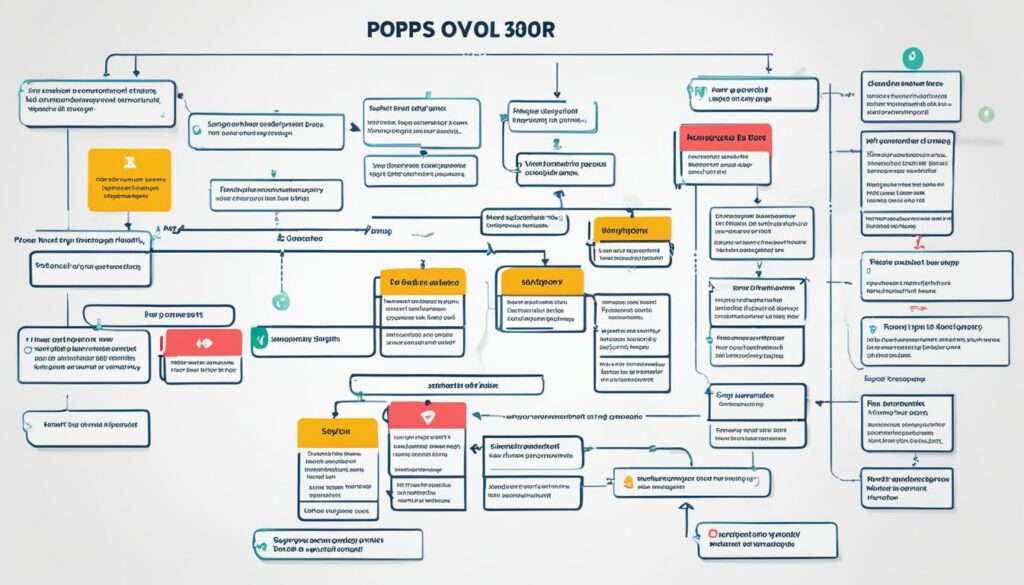Welcome to the world of project management! Whether you’re a seasoned professional or just starting your career, having a strong onboarding plan is crucial. A well-designed onboarding process sets the tone for your experience and helps you integrate into the organization effectively. In this article, we will guide you through the steps to create a project manager onboarding plan that will set you up for success.
Key Takeaways:
- A project manager onboarding plan is essential for the success of new project managers.
- Onboarding provides role clarity, helps develop relationships, and internalizes company policies and culture.
- Effective onboarding contributes to project manager productivity and engagement.
- A 30-60-90 day plan template can be used as a checklist for onboarding project managers.
- An effective onboarding process should be measurable and fit within existing workflows.
Why Onboarding is Important for Project Managers
Effective onboarding is crucial for the success of project managers. It provides them with the necessary support, role clarity, and understanding of company policies and culture, setting them up for success in their new roles. Proper onboarding contributes to their productivity and engagement, ensuring that they can effectively manage projects and deliver successful outcomes.
Without a well-designed onboarding process, project managers may experience low morale and low engagement, leading to project failures. Onboarding helps project managers to integrate into the organization and develop relationships with team members, stakeholders, and clients. It ensures that they have the resources and information they need to make informed decisions and carry out their responsibilities effectively.
By investing in effective onboarding for project managers, organizations can foster a positive work environment, increase job satisfaction, and reduce turnover rates. It also helps in retaining top talent and building a strong project management team.
During the onboarding process, project managers gain a clear understanding of their roles and responsibilities, project management methodologies, communication protocols, and key performance indicators. This enables them to align their work with organizational goals and carry out their duties in a way that contributes to the overall success of the projects they manage.
Overall, effective onboarding for project managers is essential for their success and the success of the projects they lead. By providing the necessary support, role clarity, and understanding of company policies and culture, organizations can set their project managers up for success and ensure that their projects are managed efficiently and effectively.
Project Manager Onboarding Plan: 30-60-90 Day Plan Template
When it comes to onboarding project managers, having a structured plan in place is crucial for their success. A well-designed onboarding plan ensures that new project managers have a smooth transition into their roles and enables them to integrate seamlessly into the organization. One effective approach to project manager onboarding is implementing a 30-60-90 day plan template.
This plan template is a checklist that outlines specific activities and goals for each phase of the onboarding process. Let’s take a closer look at what a typical 30-60-90 day plan for project managers may include:
- 30 Days: During the first month, the focus is on introducing the new project manager to the team and familiarizing them with company policies and procedures. This can include meetings with key stakeholders, shadowing experienced project managers, and providing access to necessary documentation and resources.
- 60 Days: In the second month, the new project manager should start taking on more responsibilities and actively participate in project-related tasks. This phase may involve assigning them smaller projects to gain hands-on experience and further develop their skills. Regular check-ins and feedback sessions should be conducted to ensure their progress.
- 90 Days: By the third month, the new project manager should be fully integrated into the team and capable of handling projects independently. At this stage, it is important to assess their performance and provide any additional training or support if necessary. Setting clear goals for their continued development beyond the onboarding period is also recommended.
By following this structured approach, project managers can gradually acclimate to their roles and responsibilities, allowing for a smoother transition and increased productivity. It also demonstrates the organization’s commitment to their growth and sets them up for long-term success.
If you’re looking to optimize your project manager onboarding process, implementing a 30-60-90 day plan template is an excellent starting point. Tailor the plan to your organization’s specific needs and make adjustments as necessary to ensure it aligns with your project manager onboarding best practices and new project manager training objectives.
Remember, a successful onboarding process is crucial for the success of new project managers and ultimately impacts the overall performance of your projects. Invest time and effort into developing a comprehensive onboarding plan that sets your project managers up for success.

What Does an Effective Project Manager Onboarding Process Look Like?
An effective project manager onboarding process is crucial for the success of new project managers. It should be measurable and incorporate a two-way feedback system to ensure continuous improvement and development. By gathering feedback from both the project manager and the team, the onboarding process can be tailored to meet individual needs and address any gaps or challenges.
Furthermore, an effective onboarding process should integrate seamlessly with existing project management workflows. This ensures that the project manager can quickly adapt to the team’s practices, tools, and communication channels, allowing for a smooth transition without disruptions to ongoing projects.
Advocacy plays a key role in the success of the onboarding process. By fostering a positive onboarding experience, project managers become advocates for the company, contributing to higher employee retention and engagement. This not only benefits the project manager but also creates a positive work environment for the entire team.
To achieve an effective onboarding process, it is important to have clear goals and milestones defined for each stage of the onboarding journey. This allows the project manager to track their progress and understand their role within the organization. Regular check-ins and performance evaluations can help ensure that the project manager is on the right track and receiving the necessary support and resources to succeed.
Incorporating an image that represents a successful and engaged project manager team could effectively visualize the importance of a well-designed onboarding process. The image could be placed here to capture the reader’s attention and enhance their understanding of the topic.
Overall, an effective project manager onboarding process sets the foundation for the project manager’s success within the organization. It promotes a smooth and seamless integration, aligns the project manager with company goals and values, and fosters engagement and growth. By investing in a comprehensive onboarding plan, companies can ensure that their project managers are equipped with the necessary tools and knowledge to excel in their roles.
How Long is Project Manager Onboarding?
The duration of project manager onboarding can vary depending on the complexity of projects, the seniority level of the new hire, and company-specific processes. However, a minimum of 90 days is needed to cover all the onboarding phases and allow the project manager to take on responsibilities independently. Ongoing employee development should continue after the initial onboarding period.
During the onboarding process, new project managers undergo training and familiarization with project management methodologies, tools, and company-specific processes. They also have the opportunity to shadow experienced project managers, learn the internal systems, and establish relationships with stakeholders.
By dedicating a minimum of 90 days to project manager onboarding, organizations enable new hires to gain a comprehensive understanding of the company’s procedures, culture, and project expectations. This duration allows project managers to develop the necessary skills and knowledge to tackle complex projects confidently.
It is important to note that project manager onboarding is not a one-time event but an ongoing process. After the initial onboarding period, continuous training, mentorship, and professional development opportunities should be provided to enhance their skills, keep them up to date with industry trends, and foster their long-term success in the organization.

Why Do You Need to Automate Your Project Manager Onboarding Process?
Automating the project manager onboarding process can significantly benefit your organization. By implementing automation, you can save valuable time and streamline administrative tasks, allowing your team to focus on more critical aspects of their roles.
One of the key advantages of automation is ensuring that new project managers receive prompt responses to their job-related questions. With automated systems in place, they can quickly access the documentation and resources they need, helping them acclimate to their roles and responsibilities efficiently.
Furthermore, automation helps maintain consistency in the onboarding process, ensuring that each project manager receives the same level of support and guidance. By standardizing the onboarding experience, you can improve efficiency and reduce the risk of crucial steps being overlooked.
Automating your project manager onboarding process also enables better tracking and documentation. You can easily monitor the progress of each new project manager and identify potential bottlenecks or areas for improvement. This data-driven approach allows you to refine your onboarding process over time and make informed decisions.
In addition, automation minimizes the risk of human error. By relying on automated systems to handle repetitive tasks and data entry, you can mitigate the chances of mistakes and ensure accuracy in the onboarding process. This not only enhances the overall efficiency but also contributes to a positive onboarding experience for new project managers.
With the increasing demands placed on project managers, it’s crucial to optimize your onboarding process. Automating the project manager onboarding process can not only save time and streamline tasks but also create a consistent and efficient experience for new team members. Invest in automation tools and technologies to ensure a seamless transition for your project managers and set them up for success.
6 Tips for a Smooth Project Manager Onboarding Process
Ensuring a seamless onboarding process for project managers is crucial for their success in your agency. Follow these six best practices to set your project managers up for a smooth transition:
- Create an internal wiki for your agency: Establish a centralized knowledge base where project managers can access essential information, such as company policies, processes, and templates. This wiki will serve as a valuable resource throughout their onboarding journey.
- Keep processes up-to-date: Regularly review and update your agency’s processes to align with industry best practices and optimize efficiency. This ensures that new project managers are onboarded with the most accurate and relevant information, minimizing confusion and potential errors.
- Integrate processes with project management software: Leverage project management software to streamline and automate various tasks and workflows. Integrate your onboarding processes with the software to provide new project managers with a seamless experience and enhance collaboration.
- Assign a buddy to the new project manager: Pairing a new project manager with an experienced mentor or buddy can greatly facilitate their onboarding process. The buddy can provide guidance, answer questions, and serve as a go-to resource for the new project manager, promoting a sense of support and camaraderie.
- Start with smaller internal projects: Introduce new project managers to the organization’s project ecosystem by initially assigning them smaller internal projects. This allows them to familiarize themselves with the agency’s processes, stakeholders, and tools before transitioning to larger, client-facing projects.
- Set expectations with key performance indicators (KPIs): Clearly define performance expectations for new project managers by establishing measurable key performance indicators (KPIs). This provides them with clear goals to strive for and enables you to gauge their progress and effectiveness during the onboarding process.
By implementing these best practices, you can ensure a seamless onboarding experience for your project managers, setting them up for success in their new roles.
Conclusion
Creating an effective project manager onboarding plan is crucial for the success of new project managers. By providing them with the necessary support, role clarity, and understanding of the company culture, an onboarding plan sets the foundation for their integration into the organization.
Following best practices in project manager onboarding, such as introducing new hires to the team, providing access to relevant documentation and resources, and setting clear goals for different phases, ensures a smooth transition and increases the chances of project manager success.
Incorporating automation into the onboarding process can save time and streamline administrative tasks. By automating responses to job-related questions and providing easy access to relevant information, agencies can create a consistent and efficient onboarding experience.
Overall, an effective project manager onboarding plan, combined with best practices and automation, enables agencies to set their project managers up for success. Investing time and resources into onboarding ensures that new project managers have the support they need, leading to increased productivity, engagement, and overall project success.
FAQ
Why is onboarding important for project managers?
Onboarding is important for project managers as it provides role clarity, helps them develop relationships, and internalize company policies and culture. It sets the tone for their experience and helps them integrate into the organization effectively.
What should be included in a project manager onboarding plan?
A project manager onboarding plan should involve activities and goals set out in time increments. It includes introducing them to the team, providing access to necessary documentation and resources, and setting goals for each phase of the onboarding process.
What does an effective project manager onboarding process look like?
An effective project manager onboarding process is measurable and incorporates a two-way feedback system. It fits within existing project management workflows, ensures a smooth transition for the project manager, and promotes employee retention and engagement.
How long is project manager onboarding?
The duration of project manager onboarding can vary, but a minimum of 90 days is needed to cover all the onboarding phases and allow the project manager to take on responsibilities independently. Ongoing employee development should continue after the initial onboarding period.
Why do you need to automate your project manager onboarding process?
Automating the project manager onboarding process saves time and streamlines administrative tasks. It ensures new project managers receive timely responses to job-related questions and have access to all necessary documentation and resources, providing consistency and efficiency.
What are tips for a smooth project manager onboarding process?
To ensure a smooth project manager onboarding process, create an internal wiki, keep processes up-to-date, integrate processes with project management software, assign a buddy, start with smaller internal projects, and set expectations with key performance indicators (KPIs).
How do you create a project manager onboarding plan?
To create a project manager onboarding plan, involve activities and goals set out in time increments. Use a 30-60-90 day plan template as a checklist, introduce them to the team, provide access to necessary documentation and resources, and set goals for each phase of the onboarding process.
Why is effective onboarding important for project managers?
Effective onboarding provides project managers with support, role clarity, understanding of company policies and culture, and contributes to their productivity and engagement, ensuring their success. Without proper onboarding, project managers may experience low morale and low engagement, leading to project failures.
What are the best practices for project manager onboarding?
Best practices for project manager onboarding include creating an internal wiki, keeping processes up-to-date, integrating processes with project management software, assigning a buddy, starting with smaller projects, and setting expectations with key performance indicators (KPIs).
Why is a project manager onboarding plan crucial for success?
A project manager onboarding plan is crucial for the success of new project managers as it provides them with support, role clarity, understanding of company culture, and sets the tone for their experience. It helps them integrate effectively and ensures a smooth transition.




